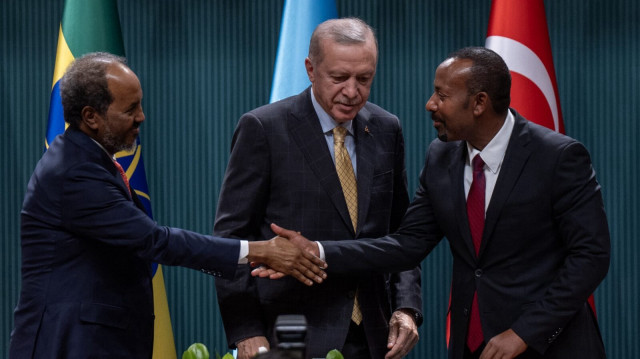
Türkiye's mediatory efforts aimed to create a space for dialogue between Ethiopia and Somalia – evidently a more effective form of diplomacy - rather than attempting to impose a solution
Heralding a shift in East Africa's geopolitical landscape, Turkish President Recep Tayyip Erdogan hosted Ethiopian Prime Minister Abiy Ahmed and Somali President Hassan Sheikh Mohamud in Ankara, showcasing Türkiye's growing role as an important diplomatic actor in Africa.
After a reported seven hours of talks, the “Ankara Declaration” made successful progress in solving the disagreement over Ethiopia's surprise Memorandum of Understanding (MoU) [1] with Somaliland, the self-declared republic in Somalia, in January 2024.
- How diplomacy calmed Ethiopia-Somalia tensions
As per the January 2024 MoU, Ethiopia previously hoped to gain both commercial access and a naval base in Somaliland's strategic Berbera port on the Red Sea in exchange for Ethiopia recognizing Somaliland as a state.
Tensions escalated as Ethiopia, the world's largest landlocked country, sought sea access, while Somalia feared its sovereignty over Somaliland, recognized internationally as part of its borders, would be violated. It even sparked fears of a conflict, especially after Egypt deployed around 5,000 troops and sent weapons to Somalia following a defense agreement [2] in August, aimed at deterring Ethiopia.
That underscored the need for calm mediation, as seen in Türkiye's proactive diplomacy, which began in an initial round of talks in early July 2024 and a second in August, aiming to get to the bottom of both sides' disagreements.
What started as "shuttle diplomacy," with President Erdogan conducting separate meetings with his Ethiopian and Somali counterparts, Abiy Ahmed and Hassan Sheikh Mohamud, the talks eventually culminated in bringing both leaders together.
In effect, Türkiye's mediatory efforts aimed to create a space for dialogue between the two leaders—evidently a more effective form of diplomacy—rather than attempting to impose a solution. Now, Ethiopia has agreed to recognize Somalia's territorial integrity in exchange for gaining commercial access to the Somali coastline. It will also ease Egypt's concerns about Somalia's sovereignty.
A further round of talks will take place in February 2025 to consolidate these efforts, including a technical delegation to detail how Ethiopia will gain equitable access to the sea while respecting Somalia's sovereignty.
- Türkiye's strategic role in Africa diplomacy
Türkiye's strong ties with both Ethiopia and Somalia uniquely positioned it to facilitate the Ankara Declaration. These ties have steadily expanded since 2011, when Ankara first donated substantial humanitarian aid to Somalia during the country's devastating famine. [3]
This role grew further when, in 2017, it established the military facility in Mogadishu named TurkSom [4] to help train Somali forces, particularly for countering groups such as al-Shabaab, a long-standing destabilizing force in the country.
This deepening engagement reflects Türkiye's broader strategy of fostering equitable partnerships in a region that has often been cautious about external interference.
It has also positioned Türkiye to fill an important gap, given that European nations and the United States (US)—which were historically influential in Africa—have reduced their engagement in the continent's disputes.
Yet beyond merely offering an alternative to actors like the US, the European Union (EU) and China, the Ankara Declaration has already enhanced Türkiye's credentials as a diplomatic actor among international actors, with the US, the United Kingdom (UK), Germany, the United Nations (UN), and others praising its diplomatic efforts [5] in resolving the Ethiopia-Somalia dispute.
Given that faith in Ankara's mediatory capabilities, Western actors wishing to engage with the Horn of Africa in the future may very well see Türkiye as a vital bridge for collaboration.
- What next for Türkiye in Africa?
Ankara will continue to play a role in consolidating Ethiopia and Somalia's ties, with President Erdogan planning to pay a visit to both countries in early 2025. Moreover, given the African Union's praise for the Ankara Declaration, it will boost trust in Türkiye's mediatory role across the continent, potentially in key areas like Libya and Sudan.
Beyond mediation, Ankara's outlook has also focused on trade and investment. And initially focused on the Horn of Africa, Türkiye has also expanded its engagement across the continent, building ties with West African nations like Nigeria and Senegal and in the Sahel.
It has been seen as a reliable partner in various forms of investment, especially in infrastructure. For instance, in 2023 alone, Turkish contractors were involved in around $85.5 billion worth of construction projects, including airports, hospitals, railways, and housing projects, according to the Trade Ministry. [6] Combined, these efforts have strengthened Ankara's ties across the continent.
While many African states may face individual challenges going forward, Türkiye's multi-sided form of diplomacy will likely further advance its cooperation across the continent going into 2025 and beyond.
[1] https://www.aa.com.tr/en/africa/ethiopia-signs-deal-with-somaliland-to-secure-access-to-sea/3097715
[2] https://www.reuters.com/world/africa/egypt-sends-arms-somalia-following-security-pact-sources-say-2024-08-28/
[3] https://www.mfa.gov.tr/relations-between-turkey-and-somalia.en.mfa
[4] https://www.setav.org/en/tag/turkiye-somalia-military-training-base-turksom
[5] https://www.aa.com.tr/en/africa/us-welcomes-turkish-mediated-deal-between-ethiopia-somalia/3423071
[6] https://www.dailysabah.com/politics/diplomacy/turkiye-pushes-for-diplomatic-economic-influence-in-africa
*Opinions expressed in this article are the author's own and do not necessarily reflect Anadolu's editorial policy.

